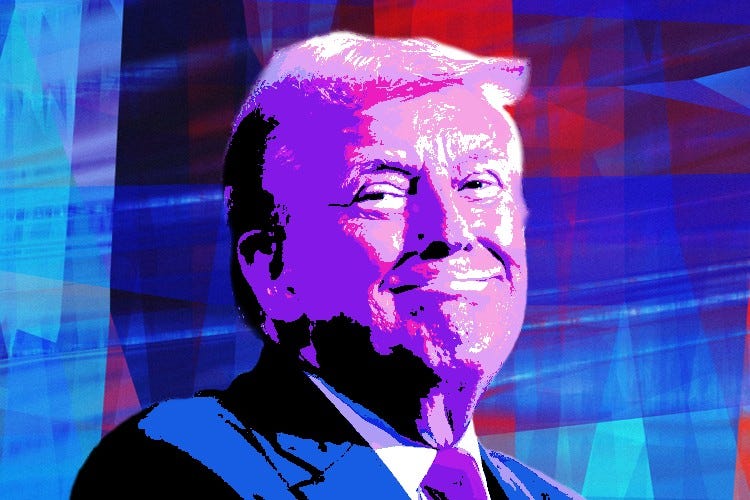In Which I Try to Reason Richard Hanania Out of His Trump Vote
It probably won't work, but what the hell

*Hey! FYI, my Friday piece will probably be a response to Harris’ DNC speech, so it’ll arrive on Friday afternoon, not Friday morning.
Why would anyone vote for Trump? Richard Hanania1 has given an answer to that question that I think is worth a read. I’m glad to encounter an answer to the “why are you voting for Trump?” question that doesn’t melt my brain with its stupidity. I’ll never forget the man-on-the-street in 2020 who said “I’m voting for Trump because he’ll let in more immigrants.” If answers like that don’t make you wonder just a little if it’s too late to scrap democracy and go back to being ruled by Hanoverian kings, then you are very different from me.
I don’t find Hanania’s argument convincing, but it has enough substance to be worth engaging. Hanania and I actually have several points of agreement, which means that we could possibly summon the rarest of things: A disagreement in which both sides agree on the facts. That is the Higgs-Boson particle of American politics — it’s rarely seen, difficult to conjure, and when it does appear, it’s gone in a fraction of a second.
Hanania’s Trump vote boils down to economics. He writes:
“In this election, one side threatens democracy and the other threatens capitalism. My sympathy towards Republicans is based on my belief that capitalism is simply much more important, and also a lot more fragile. Advanced democracies practically never morph into dictatorships, while all of them are plagued by policies that are much too statist. Moreover, the threat to democracy is unique to Trump, while hatred of markets is deeply embedded in the left. When Trump appoints Republican judges, they won’t be harming democracy thirty years down the line, while Democrat judges will continue finding bad reasons to restrict individual liberty and make society poorer for the rest of their lives.”
I’m tempted to respond to this by arguing that Hanania should value other stuff more. It’s amazing how much shit Hanania talks about the guy who is going to win his vote — he agrees that Trump is a anti-democratic nativist with no respect for the law. Those seem like big things to me. Waving away your candidate’s gleeful pissing on the Constitution is a hell of a maneuver, especially when only eight years ago, Republicans treated suboptimal e-mail management as an existential threat to the republic.
But for the sake of argument, I’ll accept Hanania’s belief that economics trumps all other considerations (pun never intended). We do agree that — at least in our present context — the biggest thing that helps or hinders a person’s ability to live the life they want to live is economics. So, to keep this conversation on track, I’ll treat economics as the whole ballgame, and if one candidate does happen to be a moral septic tank whose gobsmacking ignorance makes us vulnerable to a panoply of terrifying low-probability scenarios, then I’ll deem that information totally irrelevant.
My first issue with Hanania’s argument is that I think his definition of “capitalism” is a bit off. This sounds like a quibble, but it leads to the source of our disagreement. The definition of capitalism I was taught in school is “an economic system in which most decisions about production and consumption are made by the free market.” Hanania and I agree that the capitalism has proven to be outstanding at generating wealth, while capitalism’s only modern competitor — socialism — has proven to be outstanding at generating starving peasants who are nonetheless driven like sled dogs by a cloistered elite.
But capitalism is not a system in which all decisions are made by the free market — it’s a system in which most decisions are made by the free market. Hanania uses “capitalism” and “freedom” almost interchangeably, but a system that is the most free is not necessarily the most capitalist. For example: Efficient markets require state intervention in the form of antitrust laws to ensure that markets stay competitive. It requires some investment in public goods that make commerce possible (police, for example). Capitalism’s proponents correctly point out that every wealthy country is capitalist,2 but it’s equally true that every wealthy country is capitalist according to a definition of capitalism that allows for some intervention in the market. The world did not get rich by watching The Road Warrior and thinking “let’s do that” — the world got rich by harnessing the power of the free market in most but not all situations.
My point is: I don’t think that Hanania’s focus on “capitalism” really clarifies anything. And therefore, I think it would be better to just talk about “good economic policy” and “bad economic policy”. Luckily, we seem to have some agreement about what constitutes good economic policy: We’re both YIMBY’s3, we both support (mostly) open flows of capital and labor, and we’re both turned off by left wing anti-corporatism that seems to view commerce as inherently wicked. Hanania and I share a goal: Get this country stinking rich. So let’s analyze which candidate seems more likely to move us towards that goal.
The only Harris proposal that Hanania cites as evidence of her hostility to capitalism is her plan to fight “price gouging” on groceries. Hanania is right that this is a dumb policy that won’t work, but three things are notable here. The first thing is that left-leaning economists have queued up to call the policy stupid — Jason Furman, Catherine Rampell, Noah Smith, Josh Barro, and the Washington Post editorial board — to give an incomplete list — have publicly said “shit sucks” (if I may paraphrase). This shows that Democrats have at least some level of a functioning auto-immune system that attacks bad ideas, and it’s probably why Harris is already distancing herself from the proposal every bit as much as Trump distances himself from his relationship with Jeffrey Epstein (that’s the last potshot at Trump’s character, I swear).
The second notable thing is that Harris’ proposal almost certainly represents political expediency, not a deep aversion to capitalism. Going after companies for “price gouging” polls well. Fox News has spent three years shitting a Smithsonian Castle worth of bricks over grocery prices, and the true-but-subtle arguments about why Democrats mostly aren’t to blame for those prices don’t get traction. So, Harris simply reached for the bluntest policy tool available.
The third notable thing is that Hanania doesn’t mention Trump’s recent masterpiece in the Museum of Dogshit Economic Policy: His proposal for a ten percent across-the-board tariff. This is like Harris’ price-gouging proposal in that it polls well but makes economists want to jump into the grizzly bear pit at the zoo. Adam Smith — the father of modern capitalism — argued against exactly this policy. So, if Harris’ proposal counts as anti-capitalist, then Trump’s certainly should, too.
Hanania correctly notes that Trump’s extreme opposition to immigration will make America poorer — he calls Democrats the “better option” on this score. I agree; I just don’t know why this doesn’t bother Hanania more. Trump’s opposition to trade and immigration throw sand into the machinery of capitalism — they have the same wealth-suppressing effect as over-regulation. Democrats sometimes pander to regulation fetishists, but Republicans have nominated as their standard-bearer a man who is such an isolationist that his ideal country seems to be Tom Hank’s situation in Castaway (except without the deadbeat volleyball). I don’t know why Hanania gives so much weight to the former issue and virtually none to the latter.
I think Hanania also gives Trump too much benefit of the doubt on the YIMBY/NIMBY question. It’s true that NIMBYism exists across the political spectrum — there are city council meetings where racists and “anti-racists” join hands to thwart progress in a moving display of short-sighted assholery. But Harris seems clearly better on this score than Trump. She’s talking the talk and at least sort of walking the walk on YIMBYism, and so is Obama, who plays something of a hand-of-the-king-for-life role for Democrats. Trump, on the other hand, is the guy who road-tested the “they want to destroy our suburbs” talking point, and Project 2025 — which Trump is distancing himself from faster than he’s distancing himself from his relationship with Jeffrey Epstein (okay, that was the last potshot) — says:
“Localities rather than the federal government must have the final say in zoning laws and regulations, and a conservative Administration should oppose any efforts to weaken single-family zoning.”
If NIMBYism was alcohol, that statement is a straight shot of Everclear.
Project 2025’s position on zoning shows that knee-jerk right-wing ideology can be just as damaging as the left-wing version. The statement above reflects a simple — and I would argue reflexive — aversion to federalism, which has been conservative dogma since at least the Reagan years. Hanania is worried that Democrats faced with complex issues will simply default to regulation, and I share this concern (as my episode titled “In What Dumpster Did Elizabeth Warren Find Her Economics Degree?” will attest). But I find the conservative propensity for under-regulation equally worrisome. Markets need some regulation to function, and there are also times when we choose to trade economic growth for safety or some other societal good. The problem is not any one ideology, the problem is a dogmatic adherence to any ideology, and I don’t think either party can claim to be clearly superior on that score.
Most of these issues ultimately boil down to competence. You may have noticed that Hanania and I are basically having a debate about which party’s kooks hold more sway. Neither is denying the presence of our kooks — Hanania’s article is actually called “Hating Modern Conservatism While Voting Republican” — but we worry that the other side’s kooks will grab the wheel and drive the economy into a ditch. So far, I’ve ceded a basic symmetry to the discussion, punching left and right in pretty much equal amounts. But I think the truth is that Republicans — and MAGA Republicans, especially — have shown a willingness to steer us near the precipice of economic disaster in a way that Democrats simply haven’t. And I think two issues demonstrate that asymmetry: The debt ceiling and Federal Reserve independence.
It is absolutely insane that Republicans threaten to destroy America’s credit rating every couple of months. Opposition to raising the debt ceiling is a quintessentially MAGA issue because it: 1) Slouches out of the Fox News/AM Radio fever swamp like some deformed beast, and 2) Is supported most passionately by people who completely misunderstand the issue. Allow me to be the billionth commentator to say: The debt ceiling does not allow the government to accrue more debt, it allows the government to pay debt it has already accrued. But saying that at this point is like reciting Tennyson to your dog — it’s simply not going to penetrate. Republicans strap on a suicide vest a few times a year and threaten to blow the economy to hell, Trump thinks that’s super cool, and the fact Republicans deem that behavior acceptable is a sign that they can’t be trusted to govern.
Trump’s desire to reduce the independence of the Federal Reserve is a threat to break something that’s been working stupendously well. The Fed’s overall track record is excellent, and that record recently includes sticking the “soft landing” from inflation that some people thought was impossible. The notion that we should let a singular idiot like Trump have a larger role in their decision-making process is like suggesting that my three year-old nephew should start calling plays for the Kansas City Chiefs. To the extent that anti-Fed lunacy gets succor, it’s from the right side of the aisle, which is more evidence that economic crankery is not evenly distributed among the two parties.
The funny thing is: Hanania frequently writes about how Republicans have a major problem with weirdos, idiots, and hacks. My argument is basically that Hanania should recognize that the mania he frequently decries is not confined to social issues: it heavily influences Republican economic policy. And Trump doesn’t contradict this lunacy — he epitomizes it. It’s true that the wackos on my side could be labeled “socialist”, just as the loons on his side might be called “anarcho-capitalist”, but labels aren’t very instructive here, since the real problem is simple dumbassery. And I think the plain fact is that, at the moment, dumbassery is more prevalent on the Republican side of the aisle. Which is a major theme in Hanania’s recent writing.
I invite Hanania to respond, either in writing or in person (I’m a comedian, so of course I have a podcast — it’s the law!). I’m sincere when I say that I enjoyed reading a pro-Trump argument that was built on a foundation of reality. No, Hanania did not convince me, and I doubt I convinced him. But maybe we provided food-for-thought for the non-crazy, non-aligned voters out there. All seven of them.
Richard Hanania is a guy with a lot of baggage who has said some absolutely horrendous things. He has also disavowed those things and is an influential person in our discourse. Rather than try to figure out who Richard Hanania is, which I don’t think I can do, I’m responding to the argument he makes in his essay, which I think I can do.
Someone might jump in here and say “Sweden is socialist!” No; Sweden is a capitalist country with a welfare state, just like every other wealthy country. A myth has formed about Sweden being socialist because Sweden’s Socialist Party was largely responsible for their generous welfare state, but they have free enterprise and are capitalist.
“YIMBY” stands for “yes, in my backyard”, and refers to a desire to encourage construction — especially of housing — by reducing red tape.







One especially notable omission from Hanania’s case is any discussion of where the actual capitalists are throwing their support—which is mostly behind Harris because markets crave stability as an essential predicate to investment, and Trump being a gleeful chaos monster is the opposite of that.
The only thing I’d add to this essay is that the path for Trump to enact his tariff plan (which he doesn’t seem to understand affects US consumers) is much much easier than for Harris to enact her awful policies.